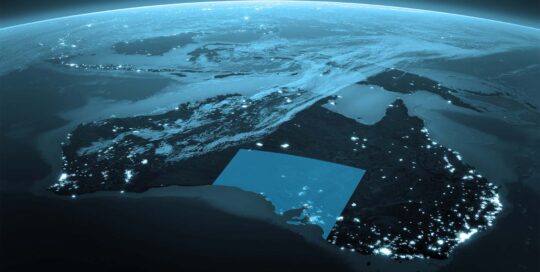With a rich history at the forefront of the nation’s space efforts, South Australia’s space ecosystem is leading the charge in creating a sustainable future for space.
Space matters. Whether we realise it or not space-based technologies are critical, intersecting with our daily lives through a multitude of touchpoints and an indirect component of many supply chains.
With origins that stem from the nation’s first rocket launches at Woomera in the 1950s, South Australia has a long, rich history at the forefront of Australia’s national and international space efforts.
Today, the state’s space sector is thriving and proving a magnet for global space businesses as well as a constellation of home-grown space companies and talent that are developing leading technologies and lifting Australia’s sovereign space industry capabilities.
The state’s education and research community is also transforming the future, introducing industry-leading course offerings to prepare our next generation workforce and developing research capabilities the push the frontiers of space innovation and knowledge.
Building expertise in Earth Observation
From enabling weather forecasting to supporting disaster management, Earth Observation (EO) satellites and the data they provide deliver decision-critical information that can improve the productivity and competitiveness of virtually every sector of the economy.
Headquartered in Adelaide, Australia’s leading national space industry and research consortium, the SmartSat Cooperative Research Centre (CRC) is focused on advancing EO and building Australia’s expertise in transforming satellite data into essential, decision-ready information.
One of the projects being led by the CRC is the South Australian Government’s mission to launch the nations’ first state-owned satellite – known as Kanyini. A collaboration with South Australian space companies Inovor Technologies and Myriota, Kanyini will provide vital data to support government decision-making around water use, climate policy, mining and emergency management.
Accelerating space tech innovation
Space-based technology plays a central role in realising sustainable environmental, social and economic benefits and local companies are playing a lead role in accelerating innovation and growth in the sector.
South Australian nano-satellite pioneer Fleet Space Technologies is one of these companies. Fleet is revolutionising mineral exploration, with its GeoSphere system combining wireless Geodes, cloud processing and a constellation of low Earth orbit nanosatellites to locate critical resources up to 100 times faster than traditional methods. Fleet has also been awarded a $6.4 million contract with Australia’s Defence Space Command to develop a low Earth orbit satellite communications system for tactical communications and data transmission where there is limited connectivity.
Silentium Defence is another company traversing the cross-sectors of space and defence. Their revolutionary Oculus Observatory located in South Australia’s Mid Murray region, utilises Silentium’s unique radar technology to deliver the widest field of view for monitoring objects in orbit, anywhere in the world.
Adelaide-based Neumann Space is also setting a new standard for in-space electric propulsion with its world-leading “Neumann Drive”. The unique propulsion system uses a solid metallic molybdenum propellant in its thruster systems and is on-track to achieve space flight heritage this year.
A centre for education excellence
South Australia is also focused on building a pipeline of Australian space industry talent.
The International Space University’s Southern Hemisphere Space Scholarship Program (SHSSP) is centred in Adelaide, providing an exciting stepping stone for emerging talent to gain essential skills in the space industry.
The state’s universities have boosted their offerings, with new courses coming online including; Outer Space Governance at Flinders University; The University of Adelaide’s Space Fundamentals Course and the University of South Australia’s Global Executive MBA (Defence and Space).
South Australia is also home to Professor Melissa de Zwart and Dr Alice Gorman – aka Dr Space Junk – who are contributing important thought-leadership in the areas of effective and efficient regulation of space and space archaeology, respectively. These fields are playing an increasing role in public debate around the sustainable and responsible uses of outer space.
Delivering cutting-edge R&D
South Australia continues to build on its reputation for delivering cutting-edge innovation, with the establishment of the Australian Research Council’s research centre for Excellence in Plants for Space (P4S) at The University of Adelaide. Together with partners including Flinders University, the centre provides a focal point for expanding Australian leadership, collaboration, and capacity in space-inspired plant and food research. P4S research will create the flexible, plant-based solutions needed to support human physical and psychological well-being during deep space travel and settlement. This research will also translate into sustainability benefits for industries here on Earth.
Adding to this, the Extraterrestrial Environmental Simulation (Exterres) Laboratory has also been established at The University of Adelaide, providing researchers with the opportunity to simulate and test equipment in both lunar and Martian surface environments. This Australian-first facility will help fast-track technologies needed to support a sustainable long-term presence on the Moon and beyond.
South Australia’s diverse and vibrant space ecosystem is on an upward trajectory, creating exciting business and career opportunities ensuring that wherever your passion in space lies, you’ll find a place in South Australia doing work that matters.





